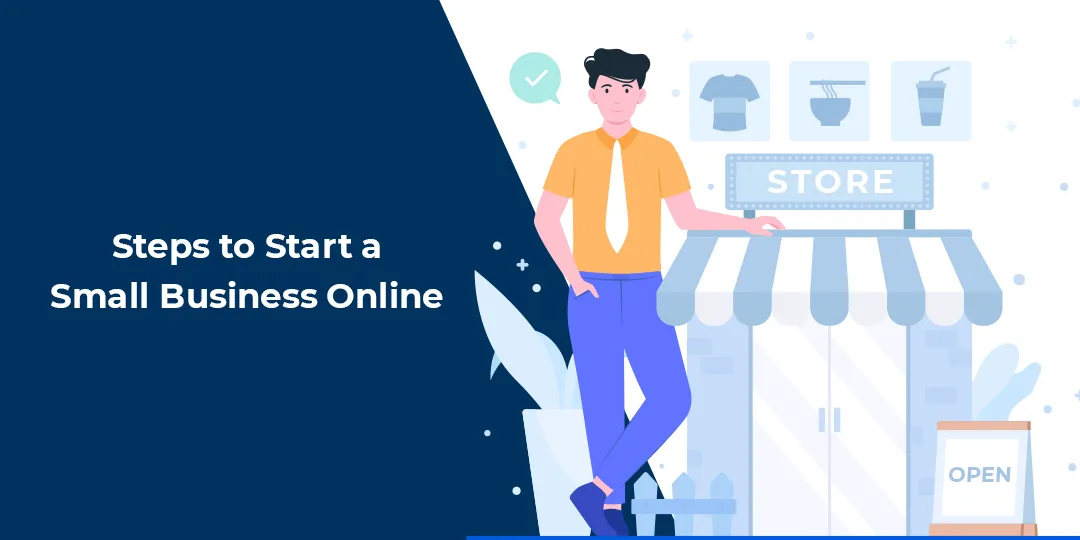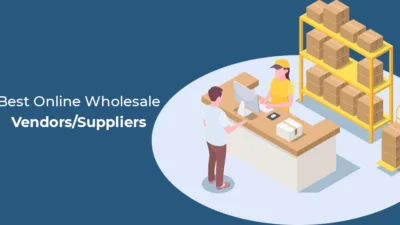Starting a business online can be an exciting and rewarding experience, but it can also be a challenging task. The digital world offers a multitude of opportunities for entrepreneurs, but it also presents unique obstacles that must be overcome to succeed.
If you are someone that is planning to launch a business online, you have landed on the right article. In this article, we have covered all the necessary information you need to launch an online business in the upcoming years. Let us walk you through the process of starting a small business online.
Types of Online Businesses
Starting an online business to generate additional income is becoming increasingly common due to the eCommerce industry’s explosive expansion. In fact, moving your small business online has several advantages over doing so offline, including lower costs and more straightforward scalability.
It’s a relief to know that this is not the case. The Internet currently offers various opportunities for income generation, including a wide range of online enterprises that can be used for this purpose.
There are many different types of online businesses, each with its own unique characteristics and potential for success. Here are some of the most common types:
1. E-commerce businesses
These are businesses that sell products or services online through a website or a marketplace like Amazon or eBay. Examples include online clothing stores, electronics retailers, and subscription-based services like meal delivery or beauty boxes.
If you’re not sure where to begin, you could work with an Amazon consultant to make things quicker and easier for you.
2. Digital products businesses
These businesses sell digital products like e-books, online courses, software, and digital art. They often require specialized skills or knowledge and can be highly profitable due to low overhead costs.
3. Affiliate marketing businesses
Affiliate marketing businesses are the ones that earn money by promoting other companies products or services through an affiliate link. They receive a commission for each sale made through their link and can be successful if they have a large following or a targeted niche audience.
4. Dropshipping businesses
Dropshipping businesses don’t stock or ship their products but instead work with a supplier who handles the inventory and fulfillment. They earn a profit by marking up the price of the products they sell on their website.
5. Freelancing businesses
These businesses offer various services like writing, graphic design, web development, and marketing. Freelancers work for clients on a project-by-project basis and can be successful if they have a strong portfolio and good marketing skills.
Now that you know what are the basic business types, let’s know the steps needed to start a small startup business online.
Steps to Start a Small Business Online
1. Conduct a Deep Market Research
A fantastic and well-shaped idea is the foundation of every successful business.
Unfortunately, most of new startup owners make one common mistake of prioritizing a product first and a market second. If you are about to launch a business online, you should know which market you want to target and then focus on what products you want to sell online, clothes, gifting items, toys, etc.
To make your move easy, choose a business field by identifying current market trends and the trending products that interest you and assure you handsome ROI. Find out what the current market leaders are doing and how you might improve it. Find current businesses in your preferred industry by performing a quick search.
If you believe that your business is capable of offering something unique from other businesses, you have found a sound concept for your online business plan.
2. Shape Your Business Idea
While starting an online business, you must never forget that there are millions of customers out there looking for a business offering products and services like you. You just have to find that group of customers and offer them a solution to their problem.
We have discussed the best and most profitable types of business in the previous point. After completing the market research, half of your answers for the choice of business idea will be cleared to a great extent.
If you want to stay away from handling the inventory stock and all, starting a dropshipping business can be an ideal business model for you. The affiliate business model will suit you if you influence people and increase your followers.
Whereas, if you are talented in different fields and love to explore your abilities, becoming a freelancer can help you get through it. Similarly, if you don’t have much high business budget but have excellent products to sell, you can use social media platforms as an online eCommerce business.
3. Choose Your Product and Its Source
After shaping your business idea, it’s time to shape the main character of the story, your PRODUCT. Whatsoever business idea or model you have shaped, you should always focus on the product that sells quickly.
Although, while researching the market and shaping your business idea, you must have already decided on the product you must focus on.
Still, product selection is not the ultimate answer. Where will you get the products in the first place? What is the source of the product? If you have decided to start a dropshipping business, even though you don’t have to handle the inventory, you have to select a dropshipping supplier whose products you will use to dropship.
You will find a dropshipping supplier for every product you want to sell.
4. Know Your Rivals
It’s crucial to understand market trends, your rivals, and your target market prior to starting an internet business. Explore the websites and stores of your rivals, purchase their goods, and use them to conduct a thorough competitive analysis. Take advantage of resources for competitor analysis, such as SEOProfiler, Moz, and Seobook.
Always remember, your goal is to learn how your rivals manage their online businesses, how they set their prices, how they advertise their goods and services, who their target clients are, and which keywords they use to drive traffic to their websites. In order to compete with them, you will need to develop your own business plans based on all of this information.
5. Name your Business
This is the most exciting step of starting your online business. While choosing your business name, you should consider these certain things;
- Brand Name should be short and sweet.
- It should be unique and catchy enough for customers to remember.
- It should be easy to read with the domains.
- Avoid using symbols and numbers, making the brand name hard to remember.
Besides all these points, carry out quick research for the business names, domain names and social media handle names to know if any names match your business names, as it can create fraud cases like copying brand and domain names.
Having the same business name as others will confuse your customers, and they will lose trust in you, and your business will lose many customers.
6. Complete the Legal Procedures
Having your own business is more than a dream-come-true situation; risking the dream at the cost of a few legal formalities can make you face some crucial casualties.
The tax rules are different for different types of businesses. A sole proprietary business’s tax rules will be different from a partnership business. It is highly advised to consult a tax specialist first to save yourself from paying high tax rates for your business.
A business license is proof of the business’s authenticity. If a business does not have one, it might lead the business owners to pay a huge amount of fine.
Similarly, suppose your target market is located across a different country, and you might need to ship your products to another country’s market. In that case, you must be crystal clear about that country’s taxing and shipping charges.
Also, more than registering the business is required. You must register the patents and trademarks too. By doing this, you can have your patent or trademark safe from getting stolen by your rivals.
7. Buy a Domain Name and Web Hosting Plan
Buying a web hosting plan and domain name comes before launching a website. Just like your business name, your domain name should also be short and catchy.
Choosing the right web hosting plan can be very intimidating, but you should consider these factors to make it easy.
1. User-friendliness
While some plans offer an intuitive interface that is ideal for novices, others demand more specialized technical knowledge to administer.
2. Compatibility
If you’re creating a WordPress website, WordPress hosting is something you should consider because it will make it easier to incorporate the CMS into your website. Search for website builders as an alternative.
3. Storage and Bandwidth
Determine your required storage space and bandwidth for your website files. To prevent issues, take into account the volume of site traffic you anticipate.
4. Speed and optimization
A fast website load time is crucial for both user experience and search engine optimization. To optimize your website, take into account using a reputable web hosting service.
5. Security
To safeguard your website from harmful activity, see if a hosting provider has numerous layers of security.
8. Launch Your Business Website
In this digital world, having an online existence for your business is very important. A website can help you reach a global audience quickly.
With the craze of launching a business online, there has been a tremendous increase in website-building platforms. Platforms like Magento, Shopify, WooCommerce, etc., allow you to quickly build an eCommerce business website.
No matter your business structure, these platforms can create an impressive eCommerce website for your business.
Hire a well-known website development agency offering brilliant website-building services and many other benefits.
9. Optimize Your Website
Launching the eCommerce business website is not the last step of starting an online business. Website optimization is the most essential step which no startup owner should miss.
There are indeed customers out there in search of your business, but it is the business that has to reach them, and how will that be possible? By conducting an SEO optimization of your website.
Your targeted audience will only search your website after your website is launched. Customers’ search queries are the ones that will help them get to your business. Website optimization is the one that will help you conclude whether your website contains the appropriate keywords or not.
For instance, if you have a website for gifting items, your customers’ search queries would be like; “best gifts for my daughter”, “gifting ideas for Mother’s Day”, etc. if your website lacks keywords related to these search queries, you customers will not be able to connect to you, and your website will not get any traffic.
In order to use appropriate keywords on your website, you should conduct keyword research using keyword research tools like SEMRush, Google Keywords Planner, KWFinder, etc.
If you want to rank your store at #1, website SEO is the only thing that can help you achieve that rank.
10. Develop your Marketing Strategies
Select the marketing strategy you’ll use for your goods or services. This typically calls for a variety of marketing techniques, such as word-of-mouth marketing, paid advertising, social media marketing, and direct client outreach.
Your market research may show you where your potential customers are and how to reach them, which will help you develop your marketing tactics. Also, make a plan for how you’ll monitor the return on your marketing investments.
Determine the sale’s lifecycle and how you’ll turn a contact into a paying customer lastly.
Conclusion
Starting a small business online is extremely scalable and affordable, which allows you to access the worldwide market around-the-clock. Though it is a very daunting process, the journey will be worthwhile if you have done everything right and have the motivation to succeed and are willing to bring out the best of yourself and your innovative mind.
With these 10 steps, you can launch your small online business and turn your aims into reality, whether you’re doing it to solve a problem, make money, or open up chances for those around you.





